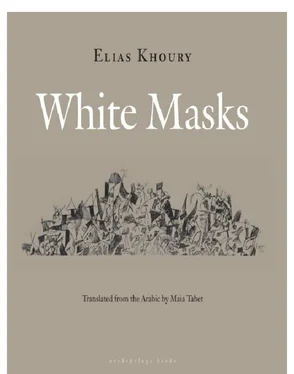People say he was the father of a martyr… Don’t ask me why, but there are martyrs sprouting everywhere these days: as far as I can see, everyone’s become a martyr, or belongs to the family of a martyr. Where did the son die? He wasn’t killed in combat, I’m sure, so how could he be a martyr?
And now Khalil Jaber’s a martyr too. I bet I’ll be the only one that gets killed without anyone calling me a martyr. And anyway, what difference does it make? Does it matter once you’re dead, whether or not they produce a poster of you?
Poor Khalil Jaber, honestly, I feel so sorry for him, nobody should have to die like that. They just dumped him there, like some piece of trash or bit of flotsam. . Is that any way to treat a person? I don’t like to meddle in things that aren’t any of my business, but it’s because of that smell. . I smell it on myself all the time, I carry it around on my own body now. Even though I wash and shower and use soap and shampoo, I still come out smelling like that! Tell me, how can I get rid of this maggot smell?
And, anyhow, why didn’t anyone consult me? They interrogated him alright but no one asked me what I thought. I’m sure Comrade Omar said I was a coward. But I’m not. He’s the coward. No, no, how could I say that, I saw him with my very own eyes lead the offensive with such bravery… but I’m not a coward, either — I’m a fighter, just like them. I’m better than they are — at least I stayed the course. The others all drifted away, but I’m still here. I live in the office and do anything that needs doing — the thought of women never even crossing my mind, not after the episode with Samar and the film!
So here I am. Anyway, how to leave and where to go? How could we abandon our martyrs?
I go to the graveyard and I talk to them. Whenever I have a serious problem I go there, and stand beside Talal’s grave and talk to him. And he answers me. He says, never mind, let it go. And I believe him. He always says everything’s fine. And I believe him. Why wouldn’t I? He was my commander. He was the one who convinced me to join the revolution. He was the one who took me off to the training camp, the one who said the revolution had started when the war broke out. We were in his house when we heard about the Ain al-Remmaneh bus. 7
“It’s started,” he said. “The revolution has started!”
That night, we went downtown, to the old commercial center, and we blew up the Kata’eb 8party offices. It was my first time doing explosives. The streets were completely deserted, it was really eerie. He asked me something and I hesitated before answering, I didn’t want him to hear how breathless I was. And Talal explained, with a smile, that it was because it was my first time. He didn’t tell me I was afraid, he just rested his hand on my shoulder as I drove, getting out of the car every now and then to lay down the explosives. On the way back, we heard them going off, one after the other, but he dragged on his cigarette calmly and said that it had begun and we had to be prepared for war.
When I go to his graveside, I don’t take flowers or anything with me. I go and ask him questions, and he tells me to be patient and that things will change.
“But they’re changing for the worse, Talal.”
“No, they’re not, you think that, but things are getting better. Everything gets better.”
Once, I told him that I wanted out, that I wanted to give up this whole business and find myself a job. He burst out laughing-I swear I heard him! He laughed so loud I had to look over my shoulder to make sure that the people who were in the cemetery, looking after the graves of their dead, hadn’t heard him. He told me to go back to the party office and wait there.
“And if you feel bored, ask them to send you to the units down south,” he said.
I asked but they refused. They told me it was because of my eye.
“Just wait,” Talal said.
So I sit here waiting, and I feel as if I’m bearing the weight of the world on my shoulders, like that mythical centaur: it feels as though all the stars and the moons, every one of the planets, the very heavens are on my back, and I am beginning to stoop under the weight of it all. I’m scared of what might happen if my back breaks, the heavens would come crashing down, as the saying goes… But they haven’t fallen, and here I am sitting tight, immovable. Didn’t he promise me that I would hold the sky between my hands? The sky is so distant, and my back is almost breaking.
I’m going to stay put, I’m not going to move; I’m just going to wait. Talal said I should, and so I am: I’m waiting for my mother, I’m waiting to get married, I’m waiting to die, I’m waiting for the revolution, I’m waiting for. . nothing in particular, just here, waiting for nothing.
They’re all the same! The difference is that when they say they’re brave, they’re lying. I’m brave but I don’t expect anything, I’m brave because I know and expect nothing.
Ladies and Gentlemen. .
I put on my dark glasses, then I take them off, and I tell you that the end does not exist. I am the only actor in the world to admit that that there is no such thing as an end. You may go now, but don’t expect an end as there isn’t one. Have you understood? No one understands. Still I wait. I’m the one who expects nothing. I’m the one who expects everything.
Captain Sameer Amro, or Abu Jassem, as he is known by everyone, is thirty-five, short, stocky, and powerfully built. He uses a cane, which he holds with his right hand, and from his waist bulges a leather cartridge belt, with bullets for his Smith and Wesson. Though his left arm is amputated at the elbow, he is quite unself-conscious about it.
The man’s reputation is legendary. His hand was severed during Black September, the month of pitched battles between the feda’iyeen and the Jordanian Army, in 1970. He was sent to one of the Eastern bloc countries for treatment, but refused to have a prosthesis fitted. “It’s better this way,” he says, and so his arm ends in a stump at the elbow. People say that even though the severed limb went on being terribly painful for over a year, but he was stoical about it, displaying exemplary fortitude and never complaining.
Abu Jassem is the stuff of legends. He was among the very first to join the revolution in 1966, abandoning his studies in electronic engineering at a university in Germany. He is reputed to have been part of Abu Ali Ayyad’s inner circle, and makes constant references to the man. Recalling the military training camp at al-Hama, off the Damascus highway, he emphasizes Abu Ali’s harsh but fatherly manner with the young recruits. If it weren’t for his fatherliness, how do you suppose we could’ve become feda’iyeen, he likes to say.
The story has it that in 1966 Abu Jassem was wounded in an operation against the Israeli army, but that he somehow managed to crawl back to the Lebanese border with seven bullets lodged in his abdomen. After a patriotic border officer picked him up and dispatched him to a hospital in Saida, the Deuxième Bureau 9got wind of the matter and Abu Jassem was arrested. Held for over a year in the Helou Barracks with his wounds unhealed and open, he bore the pain with outstanding courage.
They say he was held there with Jalal Ka’wash, the feda’i who died in custody after he was dragged around the compound roped to the back of a vehicle. At the time, the Lebanese government issued a statement alleging that Jalal Ka’wash had taken his own life by throwing himself off the third floor of the building. Abu Jassem never talks about Jalal — if you ask him, he just shakes his head and gazes into the distance. He will only talk about the period of his interrogation.
A terrible period.
Читать дальше












